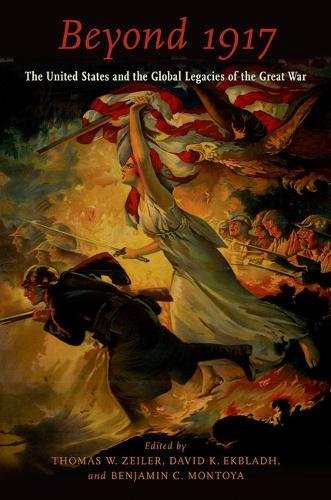

Most ebook files are in PDF format, so you can easily read them using various software such as Foxit Reader or directly on the Google Chrome browser.
Some ebook files are released by publishers in other formats such as .awz, .mobi, .epub, .fb2, etc. You may need to install specific software to read these formats on mobile/PC, such as Calibre.
Please read the tutorial at this link: https://ebookbell.com/faq
We offer FREE conversion to the popular formats you request; however, this may take some time. Therefore, right after payment, please email us, and we will try to provide the service as quickly as possible.
For some exceptional file formats or broken links (if any), please refrain from opening any disputes. Instead, email us first, and we will try to assist within a maximum of 6 hours.
EbookBell Team

0.0
0 reviews"Beyond 1917: The United States and the Global Legacies of the Great War, which explores how and why the First World War has become an integral milepost for human history, reflects the importance of the conflict, the forces that led to it, and the forces it let loose. These legacies have been a shifting set of lessons, interpretations, and costs left by an unparalleled global war that generations have now grappled with for decades. How we remember and interpret the war remains one of its great legacies. Yet legacies are not historically remote things; they were felt from the moment the conflict began and have shifted and been reinterpreted ever since. There is no one legacy of the First World War, of course, but an unstable set of lessons, interpretations, perceptions, and costs left by the conflict that are addressed in these essays. Beyond 1917 provides a novel angle: that of the endgame, the consequences, the impact of the war - both immediately, medium-term (in the following few decades after its conclusion), and into recent times. This international group of scholars demonstrates the reach of the legacies of the First World War, both in and on history. Despite the nation's rather ambivalent memory of the conflict, the United States in the world serves as the conceptual hub for what follows in this volume. This was done with the understanding that there are myriad ways exploring what the conflict wrought around the globe and across time. For historians, critical themes, even the structure of patterns of inquiry in the broader scholarship of international and global history, are not free from the pull of the memory of Great War"--
"Beyond 1917: The United States and the Global Legacies of the Great War, which explores how and why the First World War has become an integral milepost for human history, reflects the importance of the conflict, the forces that led to it, and the forces it let loose. These legacies have been a shifting set of lessons, interpretations, and costs left by an unparalleled global war that generations have now grappled with for decades. How we remember and interpret the war remains one of its great legacies. Yet legacies are not historically remote things; they were felt from the moment the conflict began and have shifted and been reinterpreted ever since. There is no one legacy of the First World War, of course, but an unstable set of lessons, interpretations, perceptions, and costs left by the conflict that are addressed in these essays. Beyond 1917 provides a novel angle: that of the endgame, the consequences, the impact of the war - both immediately, medium-term (in the following few decades after its conclusion), and into recent times. This international group of scholars demonstrates the reach of the legacies of the First World War, both in and on history. Despite the nation's rather ambivalent memory of the conflict, the United States in the world serves as the conceptual hub for what follows in this volume. This was done with the understanding that there are myriad ways exploring what the conflict wrought around the globe and across time. For historians, critical themes, even the structure of patterns of inquiry in the broader scholarship of international and global history, are not free from the pull of the memory of Great War"